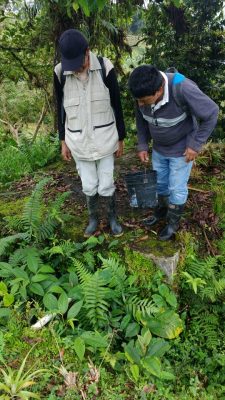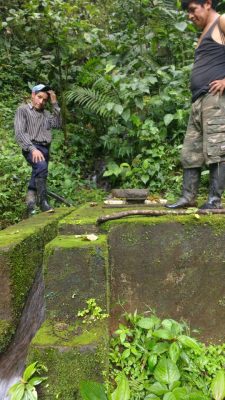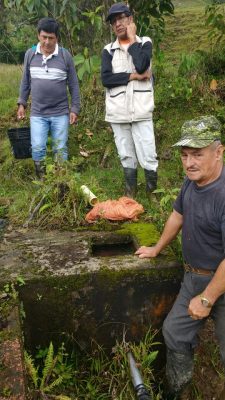This project is made possible through the partnership of WATER CHARITY and the NATIONAL PEACE CORPS ASSOCIATION. ![]()
This project has been completed. To read about the conclusion, CLICK HERE.
 Location
Location
San Juan, Cumbal, Nariño, Colombia
Community Description
The community of San Juan, located in southwestern Colombia along the Ecuadorian border, is a part of the Mayasquer indigenous Resquardo (Resguardo is a governance structure that provides for communal land ownership and traditional methods of participation in local decision-making and policing). It has a population of around 350 people. While residents are a mix of Pasto indigenous, Awá indigenous, and Mestizos, the community strongly self-identifies with an overarching indigenous identity based on the Pasto culture, supporting impressive local cohesion and strong local governance structures.
Nearly all families are smallholders (farming under 20 acres), and the area’s cloud forest climate (~4000’ above sea level) provides excellent growing conditions, supporting livelihoods based on the cultivation of sugarcane, coca, lulo, and guava and occasional fish farming and cattle ranching. Many families also maintain significant cultivars for household consumption, as limited road infrastructure has historically encouraged food sovereignty.
With much of San Juan’s communal land still in primary montane forest, the area presents a critical corridor for wildlife habitat continuity, linking protected areas in the Ecuadorian and Colombian Andes and those protected by the Awá indigenous population in the countries’ Pacific lowlands.
Problem Addressed
In recent years, the community of San Juan has experienced population growth, leaving many of its dispersed houses unserved by the current rudimentary and decrepit water system that was constructed in the 1980s. Lack of a reliable potable water system has led to high levels of diarrheal disease and parasitic infections.
San Juan suffers from the same abandonment by state and international actors common to many rural Colombian areas where non-governmental armed groups (GANEs) have been active during the country’s internal conflict. While recent military presence in Mayasquer may lead to additional improvements to local transportation infrastructure and greater connection with the rest of Cumbal Municipality and Nariño in general, the likelihood of San Juan gaining access to essentials such as high-quality drinking water and sanitation services without the support of an outside organization is very small.
Project Description
This project is to rehabilitate the water system serving San Juan.
 The project will include the following:
The project will include the following:
1)Rehabilitate the existing gravity-fed water system’s catchment infrastructure, construct new catchment infrastructure using an additional water source, and install centralized water treatment using sand filtration and/or chlorination to provide improved water quality.
2)Install over 7Km of distribution pipelines and metered household connections for ~70 families and a school serving ~150 students.
3)Training for community members on environmental conservation and water, sanitation, and hygiene (WASH) topics, and in-depth training for a locally-elected water committee on WASH, organizational, technical, and administrative aspects of water system management.
4)Permanent conservation agreements for land surrounding the system’s two water sources, with provisions for land acquisition by the community’s water committee and future conservation area expansion.
The work will be carried under the direction of, Green Empowerment (GE) and their Ecuadorian local partner organization Fundación de Desarrollo de Alternativas Comunitarias de Conservación del Trópico (ALTROPICO). They will work with the community of San Juan to not only improve the quality of life for residents but also to motivate broader conservation practices by the local population and increased recognition of the importance of Mayasquer’s communally-owned forests as part of the conservation corridors linking both government- and indigenous-protected areas in the Andean highlands with those in the coastal plains.
The project will also provide a new local water committee with the capacity and leadership skills to improve local health and environmental management practices and to participate actively in watershed-wide planning and management activities coordinated by ALTROPICO with local, regional, and national-level actors.
Beneficiaries will contribute unskilled labor and logistical support (materials transportation) for water system construction, major undertakings considering the distance to be covered by the system. In addition, local residents will form a water committee in accordance with the national legal framework to manage system use and ensure sustainability, collect usage fees, and participate in continuous training opportunities provided by GE, ALTROPICO, and other local actors.
Landowners whose terrain surrounds both the current and new water catchment sites have also agreed to sign permanent conservation agreements for the areas surrounding the water sources, providing for the gradual purchase of these several-acre lots by the water committee to provide for the permanent conservation of San Juan’s water resources.
 Project Impact
Project Impact
350 people will benefit from the project.
Returned Peace Corps Volunteer Directing Project
Elise Kittrell, RPCV Peru (2014-2016), Technical Manager of Green Empowerment.
Monitoring and Maintenance
Prior to project implementation, baseline surveys will be conducted to determine the state of the current water system and assess the communities’ health, current water access, and knowledge on water, sanitation, and hygiene (WASH) best practices and water system operation, maintenance and administration. With this information, the project work plan will be developed with the community, ensuring the technology and training provided is what is needed and will continue to be utilized after project completion.
A community-elected committee will be formed and trained on proper water system operation and maintenance, as well as administrative topics. This committee will be in charge of managing the water system, making sure potable water is being delivered to the households, maintenance is conducted in a timely manner, and payments from beneficiaries are received on time. The water system committee will also be provided manuals on these topics to use as a guide if they have questions in the future and will be able to contact ALTROPICO if needed.
Community members will receive interactive water, sanitation and hygiene training on topics such as water use and storage and proper handwashing. Community members will be required to participate in this training in order to receive a household water connection. Once the project construction and training are completed, follow-up surveys will be done to check for knowledge learned by the water system committee and community members and a final walk-through of the water system will be conducted.
GE will evaluate the project through field reports, documentation, and photos from each training session, in addition to attendance lists and their comparison to overall population numbers.
Additionally, GE will conduct baseline and post-project surveys on diarrheal disease incidence in each community and focus groups at the end of the project with community members to gather additional qualitative data and community feedback on the project and its impacts.
Comments
In combination with a prior GE/ALTROPICO community water system project in the neighboring community of Tallambi, success in San Juan will serve as the basis for a broader proposal by local indigenous leadership to address water and sanitation needs for the rest of Mayasquer’s communities, using chancellery development funds for border areas related to Colombia’s ongoing peace process.
ALTROPICO has worked with local leaders in the Mayasquer Resguardo for over 15 years on economic productivity, conservation, and governance issues, and will continue to work with these communities in 2018 on new conservation, water, and food sovereignty efforts. San Juan presents a major opportunity to leverage the reputation ALTROPICO has built in the region, the success of the Tallambi project, and ongoing watershed conservation efforts in local tributaries of the Río Mira to empower rural leaders and make sustainable, concrete improvements in health and environmental outcomes.
Project Funding
The funds to get this project underway have been provided by the Paul Bechtner Foundation. We continue to accept donations so that we will have funds on hand for the next project in Colombia. Please use this Donate button, and your donation will be attributed to this project and the project director will be notified.